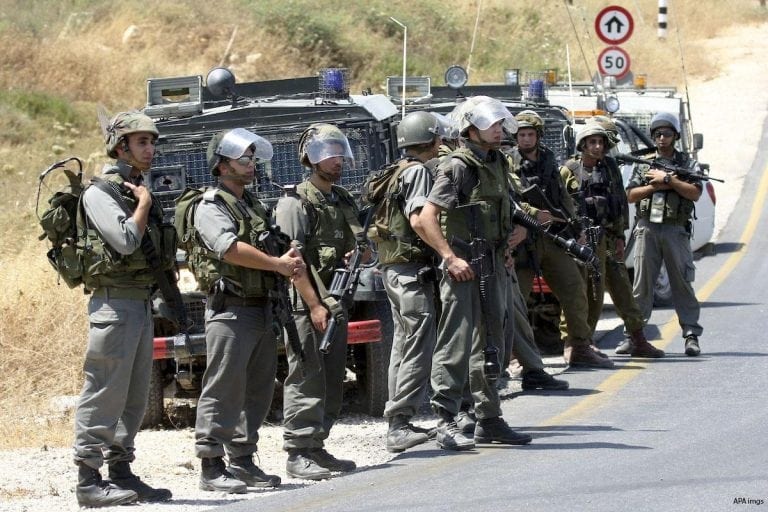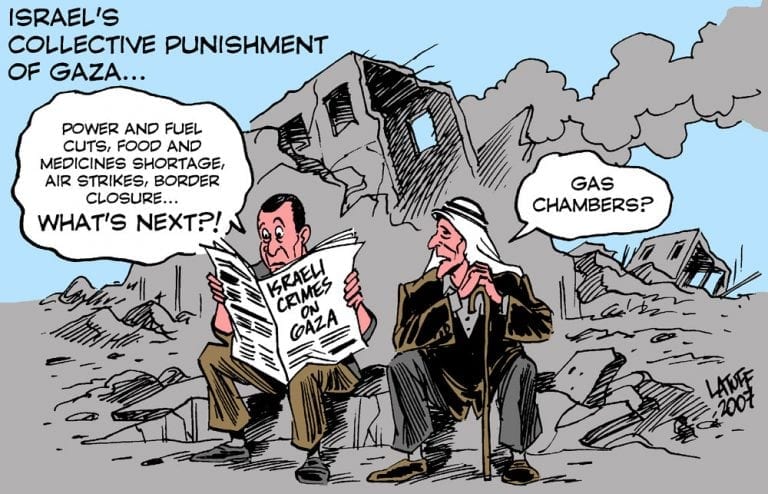Kingdom of Olives and Ashes - Writers Confront the Occupation. Michael Chabon, Ayelet Waldman, Ed. HarperCollins Publishers, Toronto. 2017.
A collection of twenty-six writers, Kingdom of Olives and Ashes touches on all the main elements of the Israeli occupation of Palestine. All are well written, as they should be for a collection of experienced writers, some tending towards emotional reactions, others simply describing events and sights leaving the reader to their own emotional reaction, while most do both. All topics are commented on as the writers experienced first hand the daily trials of life in Palestine.

Israeli occupation forces
The writers visited Israel/Palestine in 2016, with small delegations organized by Breaking the Silence, the group of former Israeli servicemen and women opposed to the occupation and its actions.

Yet, through these writers eyes and ears, the steadfastness, resilience, generosity, and kindness of the Palestinian people stands in contrast to the general contempt and anger against them by the settlers, and the bored, uncaring youth that make up the occupation forces.
An unintended reveal is that of the depth of the Israeli narrative even within this group of writers. One of the writers says, “I feel the ever more colonial bias of recent governments….may be terribly prejudicial to Israeli democracy and the future of the country. Nothing degrades the political life of a nation more than sliding down a nationalist or colonialist path.”
Israel has turned into “ a colonial, overbearing country and which has done so much damage to the positive, almost exemplary, image that it had for a long time throughout the world.”
Lots of truth in those statements, but it reveals the overriding narrative that Israel is a democracy, and exemplary one at that. That is the image that Israel has promulgated along with western media, but the reality of history is that Israel has always been a colonial-settler racist society and thus very much not democratic. It is, after all, a well crafted image, crafted by words, photos, and above all, by well placed money and threats.
 Another author writes “Israel faces an existential threat, by its very location in the midst of enemy countries.” This is the Israeli narrative of Israel as victim, being weak, needing protection, necessitating its belligerence towards the enemy. Yet Jordan has always been weak and generally done as required by Israel - and has a peace treaty with Israel. Egypt has a peace treaty and is supporting Israel’s control of Gaza. Iran has previously traded oil with Israel as well as receiving assistance during the Iran-Iraq war. Saudi Arabia is a de facto ally, tied into the U.S. petrodollar system, and currently aiding and abetting ISIS along with Israel in Syria.
Another author writes “Israel faces an existential threat, by its very location in the midst of enemy countries.” This is the Israeli narrative of Israel as victim, being weak, needing protection, necessitating its belligerence towards the enemy. Yet Jordan has always been weak and generally done as required by Israel - and has a peace treaty with Israel. Egypt has a peace treaty and is supporting Israel’s control of Gaza. Iran has previously traded oil with Israel as well as receiving assistance during the Iran-Iraq war. Saudi Arabia is a de facto ally, tied into the U.S. petrodollar system, and currently aiding and abetting ISIS along with Israel in Syria.
Israel is not surrounded by enemies, at least not at the level of governance. They have the strongest military, they have hundreds of nuclear weapons with air and sea launch platforms, and they have the support of the all western countries regardless of official positions.
The threat for Israel is at least twofold, and both are internal. First off it is its own worst enemy as indicated above as it “degrades” itself with its racist colonial settler policies. Secondly, and always, has been the demographic threat, recognized by the first Zionists such as Jabotinsky and Herzl, and continuing up to Ben Gurion, and all Palestinian leaders. Thus the ethnic cleansing during the nakba, during the six day war, and the slow, persistent ethnic cleansing of the settlements, evictions, house destructions that has been ongoing since the state was formed.
The Israelis have always recognized that the land was occupied before they arrived. They crafted an image, a narrative, to conceal their real intentions and actions.
I applaud these authors and the resulting book for their personal examination of their own thoughts and feelings, expressed in short well written essays. For a newcomer to the Palestinian crisis, these stories provide a close up personal view of the lives of the Palestinians, a view never offered by western mainstream media. For more well informed readers, aware of the historical trends, and probably aware of the many personal sufferings of the Palestinians, it serves as a reminder that the occupation continues unabated, more constricting than ever.
 In his zeal to prove to his antagonists in the War Party that he is as bloodthirsty as their champion, Hillary Clinton, and more manly than Barack Obama, Trump seems to have gone “play-crazy” -- acting like an unpredictable maniac in order to terrorize the Russians into forcing some kind of dramatic concessions from their Syrian allies, or risk Armageddon.However, the “play-crazy” gambit can only work when the leader is, in real life, a disciplined and intelligent actor, who knows precisely what actual boundaries must not be crossed. That ain’t Donald Trump -- a pitifully shallow and ill-disciplined man, emotionally handicapped by obscene privilege and cognitively crippled by white American chauvinism. By pushing Trump into a corner and demanding that he display his most bellicose self, or be ceaselessly mocked as a “puppet” and minion of Russia, a lesser power, the War Party and its media and clandestine services have created a perfect storm of mayhem that may consume us all.— Glen Ford, Editor in Chief, Black Agenda Report
In his zeal to prove to his antagonists in the War Party that he is as bloodthirsty as their champion, Hillary Clinton, and more manly than Barack Obama, Trump seems to have gone “play-crazy” -- acting like an unpredictable maniac in order to terrorize the Russians into forcing some kind of dramatic concessions from their Syrian allies, or risk Armageddon.However, the “play-crazy” gambit can only work when the leader is, in real life, a disciplined and intelligent actor, who knows precisely what actual boundaries must not be crossed. That ain’t Donald Trump -- a pitifully shallow and ill-disciplined man, emotionally handicapped by obscene privilege and cognitively crippled by white American chauvinism. By pushing Trump into a corner and demanding that he display his most bellicose self, or be ceaselessly mocked as a “puppet” and minion of Russia, a lesser power, the War Party and its media and clandestine services have created a perfect storm of mayhem that may consume us all.— Glen Ford, Editor in Chief, Black Agenda Report 



